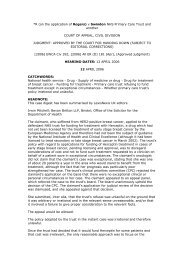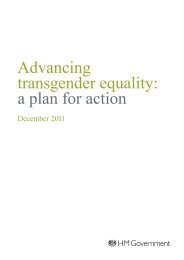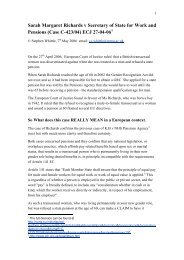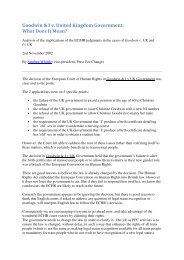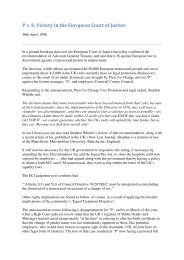Transgender EuroStudy â Legal Survey and Focus ... - ILGA Europe
Transgender EuroStudy â Legal Survey and Focus ... - ILGA Europe
Transgender EuroStudy â Legal Survey and Focus ... - ILGA Europe
Create successful ePaper yourself
Turn your PDF publications into a flip-book with our unique Google optimized e-Paper software.
63 April 2008<br />
training in cultural competence on the needs of trans people.<br />
It has been suggested that centralised institutional-based systems of healthcare for trans<br />
people offer a poor st<strong>and</strong>ard of care for trans patients <strong>and</strong> that community-based clinicians,<br />
particularly if they can be trained in core competencies can provide a good service to trans people<br />
(Goldberg 2006; Scottish Needs Assessment Programme 2001). Indeed, many of the findings above, in<br />
particular the narratives about improper treatment suggest that many practitioners in centralised<br />
trans-related healthcare provision have power <strong>and</strong> control over trans people that might be used<br />
inappropriately. In short then, the best model of treatment would be trans-specific clinics with<br />
regulated clear care pathways <strong>and</strong> ‘transpositive’ (Solymar 2006) where clinicians have received<br />
advanced training in trans issues (Nemoto 2005).<br />
The GLBT Health Access project in Massachusetts (1999) has developed Community St<strong>and</strong>ards<br />
of Practice to provide a benchmark for healthcare providers <strong>and</strong> users, which is comprehensive <strong>and</strong><br />
far-reaching. It includes policies <strong>and</strong> practices which prohibit discrimination, with an emphasis on<br />
cultural competencies (appropriate language; familiarity with LGBT issues; community relations <strong>and</strong><br />
outreach etc.). From the evidence above, it is clear that many of the problems that trans people face<br />
accessing good quality care could be improved by the training of healthcare providers.<br />
Conclusion<br />
The data from this research shows that regardless of earnings <strong>and</strong> social status, the healthcare treatment<br />
for trans people currently being provided in their countries is very poor. In terms of clinical need, a high majority<br />
of respondents are not getting State funding for hormones <strong>and</strong> primary baseline surgeries. Nearly one third<br />
were refused treatment because a healthcare practitioner did not approve of gender reassignment. More than<br />
half of the groups at both ends of our occupational <strong>and</strong> earnings spectrum are paying for surgery themselves<br />
after being refused State funding. Given that nearly half of all respondents are in the lower income bracket of<br />
less than €25,000 per year this is an onerous <strong>and</strong> unnecessary financial burden.<br />
In terms of treatment of trans people by healthcare professionals, approximately one quarter of<br />
respondents seeking access to gender reassignment treatment did not get an acceptable response<br />
from a healthcare practitioner – they did not want to help. Given this, it is significant that the<br />
narratives from the focus groups <strong>and</strong> survey found that trans people avoid accessing routine<br />
healthcare because they anticipate prejudicial treatment from healthcare professionals. This<br />
corresponds with our finding that approximately a quarter of the respondents across the groups<br />
experienced adverse treatment by healthcare professionals because they were trans. There is strong<br />
evidence from the focus group <strong>and</strong> survey data that the link between seeking gender reassignment<br />
<strong>and</strong> mental illness is a strong factor in the (mis)treatment of trans people.<br />
Gender Identity Disorder, the more medicalised name for being trans, is still recognised by the<br />
American Psychiatric Association as a disorder in the Diagnostic <strong>and</strong> Statistical Manual IV, <strong>and</strong> they approve<br />
of gender reassignment treatments, as no cure is known. The World Health Organization also recognises it as<br />
a disorder in the ICD10; to be treated by hormone therapies <strong>and</strong> surgery where appropriate.<br />
The vast majority of health care trans people need is not related to their being transgender, yet<br />
as the survey <strong>and</strong> focus groups have shown even that health care is constantly compromised. In no<br />
other recognised medical field are doctors, nurses, <strong>and</strong> radiographers for example given such free<br />
range to insult <strong>and</strong> embarrass their patients.<br />
Trans people are ordinary people who just happen to have a medical condition that needs




